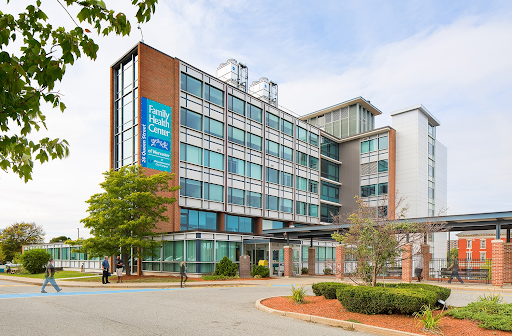Fellowship Structure and Daily Schedule
Fellows perform a mix of outpatient clinical work, shadowing, self and collaborative study, clinical case review, didactic learning, conference attendance, and teaching.
 Family Health Center of Worcester's main clinical site at 26 Queen Street.
Family Health Center of Worcester's main clinical site at 26 Queen Street.
Outpatient care: Fellows provide 4-5 sessions of direct patient care each week in the health center. Each fellow has a panel of patients at Family Health Center of Worcester with an emphasis on primary and psychiatric care for patients with psychiatric conditions and substance use disorders. FHCW is a federally-qualified community health center serving a large and diverse population of patients, including those who are working class, poor, BIPOC, immigrant, refugee, asylum seeking, LGBTQ+, unhoused, living with HIV, and struggling with substance use disorders.
In addition, fellows provide in-house consultation support to the PCPs of other patients with psychiatric care needs during a weekly provider curbside session and several direct patient consultation slots incorporated into the previously mentioned patient care sessions. Those with such training are also encouraged to maintain their prenatal care skills by caring for prenatal patients with psychiatric conditions and substance use disorders. Fellows receive training in psychotherapy techniques such as motivational interviewing and CBT and provide psychotherapy under the supervision of behavioral health faculty.
Fellows are members of the FHCW Psychiatry Team and are included in monthly meetings coordinating efforts to provide mental health care within the health center and community. They enjoy a collaborative relationship on that team with a psychiatrist, family medicine physicians with fellowship-training in primary care psychiatry, and psychiatric nurse practitioners.
Fellows typically do not provide any care on evenings or weekends. There are no call responsibilities. The fellowship is designed to allow ample time for you to be thoughtful, process emotionally complex situations, and recover from the stress of residency training.
Self and collaborative study: Fellows use the curricular theme schedule (learn more under Curriculum) as a guide for self-directed readings. Fellows inherit and maintain a list of suggested readings and viewings for each subject. Study materials include books, journal articles, online lectures and webinars, and other materials identified by the fellow, fellowship director, associate fellowship director, collaborating psychiatry faculty and psychotherapy consultant.
Clinical case review: The fellow meets with collaborating members of the psychiatry faculty, typically their clinical and academic mentor, on a weekly basis to discuss clinical cases or readings on the current curricular theme. They also meet weekly with the fellowship director and/or associate director for a case review and education seminar.
Didactics: Fellows attend didactics provided by the UMass Chan Psychiatry Residency each week, including case conferences and seminars on Psychopharmacology, Biological Psychiatry, Child and Adolescent Psychiatry, and Clinical Neuroscience. They also attend Grand Rounds in both the Department of Psychiatry and the Department of Family Medicine and Community Health. They are also welcome to attend UMass Chan Family Medicine Behavioral Health Fellow didactics when their schedule permits. During the fall, they have the opportunity to complete the Certificate of Intensive Training in Motivational Interviewing within the UMCMS Center for Integrated Primary Care.
Conferences: Fellows can use their CME funds to attend various conference, which may include:
- Association of Medicine and Psychiatry Annual Conference
- UC Irvine/UC Davis Essentials of Primary Care Psychiatry Conference
- MGH Psychiatry Academy Psychopharmacology Conference
- Integrated Care Conference by the Collaborative Family Healthcare Association
- Annual Meeting of the Society for the Study of Psychiatry and Culture
- Society of Teachers of Family Medicine Annual Spring Conference
Teaching: Developing teaching skills and resources is one of the main foci of the fellowship. Fellows receive a faculty appointment at the level of Instructor to reflect their role as educators. They provide direct teaching to their primary care colleagues through curbside consultations held weekly with the fellowship director. They are also encouraged to view their consult notes as tools for educating provider colleagues and develop a template that concisely answers the questions primary care providers most need to know while sharing clinical pearls. Throughout the fellowship, fellows are scheduled to teach on primary care psychiatry topics in various settings, such as provider meetings, afternoon chart rounds, didactics for several collaborating regional nurse practitioner residencies, didactics for the UMass Chan and Fitchburg Family Medicine residencies, and FMCH Grand Rounds. Fellows are encouraged to attend the Teaching of Tomorrow Program for Faculty Development and are eligible to have their $1600 tuition paid by the department.
Evaluation: Though the fellowship is not accredited, fellows are evaluated according to the ACGME core competencies, namely patient care, medical knowledge, practice-based learning and improvement, interpersonal and communication skills, professionalism, and systems-based practice. They are also evaluated in the development of their teaching skills. Evaluators include the members of the fellowship team, team nurses and medical assistants who have worked closely with the fellow, affiliate faculty who have worked with the fellow, and learners who have received teaching from the fellow.